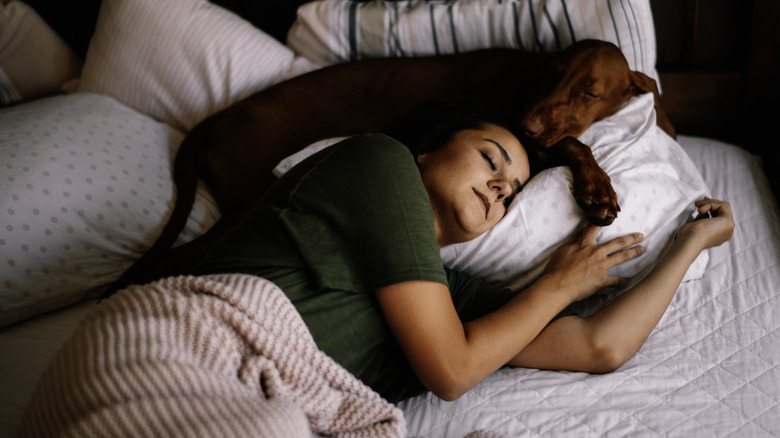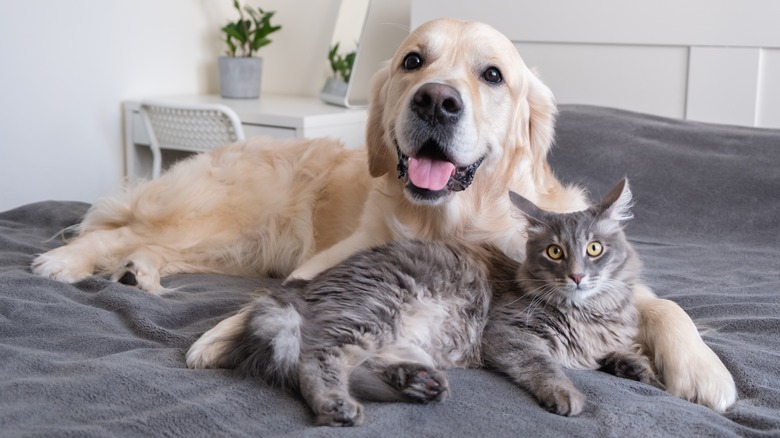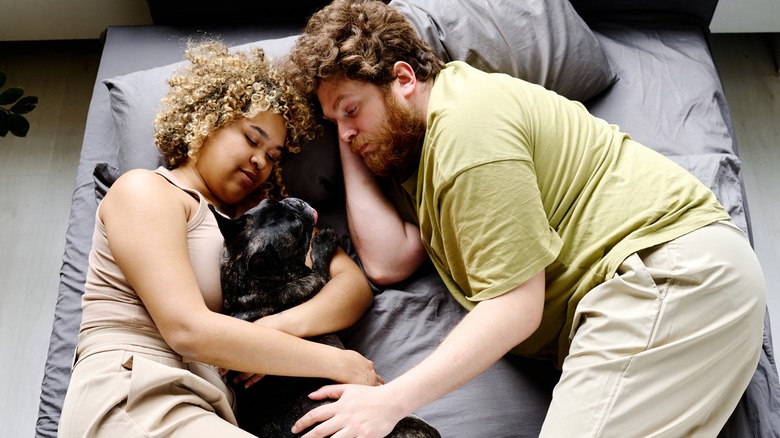How Keeping Your Dog Or Cat Away From The Bedroom Can Give You A Better Night's Sleep
Of all the things you may take into the bedroom with you at night — your phone, a glass of water, a feel-good book — is your pet also one of them? While the bedroom is intended for rest and relaxation, for some people, a bed can become a pretty crowded place fairly quickly. Between partners, kids, and all those extra pillows, it can feel all the more cramped with your furry companion in tow.
In a 2015 study published in Mayo Clinic Proceedings, out of a polled 150 patients, 105 reported having at least one pet. Of these individuals, 56% said that they allow their pets to accompany them into the bedroom at night. However, 20% of these patients stated that they found their pets to be disruptive to their sleep.
To some experts, such as Dr. Vsevolod Polotsky, director of sleep research and a professor in the department of medicine at Johns Hopkins University School of Medicine, these results are not entirely surprising. "Animals may move, bark and disrupt sleep," Dr. Polotsky told CNN. "Sleep in dogs (and cats) is not continuous and they will inevitably get up and walk on the bed, stepping on people. All of that activity will lead to sleep fragmentation."
Sleep challenges of cat-lovers versus dog-lovers
Whether it's the chirp of a parakeet or the squeak of a hamster, it is, of course, possible to have your sleep disrupted by any type of animal noise. However, a 2023 study published in Human-Animal Interactions found that cat owners and dog owners, in particular, may face some uniquely different sleep challenges.
The researchers looked at data from a 2005-2006 health survey that posed a variety of questions to respondents, some of which were about whether they owned a pet, the type of pet they had, snoring frequency, diagnosis of sleep disorders, sleep latency, how much sleep they get nightly, and much more. Among 5,499 total participants, it was found that dog owners were more likely to have difficulty sleeping and be diagnosed with a sleep disorder than individuals who did not have a dog. Conversely, cat owners were more likely to experience leg jerks at night compared to non-cat owners.
For those with allergies, sleeping with a pet may even further disrupt their sleep. After all, snoozing on a blanket or pillow coated with pet hair does not make for a good night's rest. Rather, being exposed to animal dander all night long may prompt respiratory allergy symptoms, such as sneezing, which can certainly keep one wide awake.
How to support your health when sleeping with a pet
The research team did acknowledge, however, that there are people for whom sleeping with a pet may be more beneficial, such as those who experience anxiety or depression. "But on an individual level," study leader Lauren Wisnieski told HealthDay, "if you're having trouble sleeping, something that you might consider trying is separating your pet from your bed or your bedroom."
But for those who would rather keep their cuddly creatures nearby, there are some ways in which you can help prioritize your health while still sleeping with a pet. Just like humans, establishing a consistent bedtime routine for both you and your pet can go a long way. For dog owners, experts at the Sleep Foundation suggest going for a walk before settling in for the night. Allowing your pet to get in a little exercise before bed may help them sleep more soundly during the night, as they may be less likely to get restless and move around. Additionally, going to bed at the same time each night can help condition your pet to know when it's time to wind down for sleep. For those with pet allergies, remember to wash your bedding on a regular basis to help reduce allergen exposure. Finally, to prevent the bed from getting overly crowded, be sure you have a large enough mattress to ensure both your and your pet's optimal comfort throughout the night.



